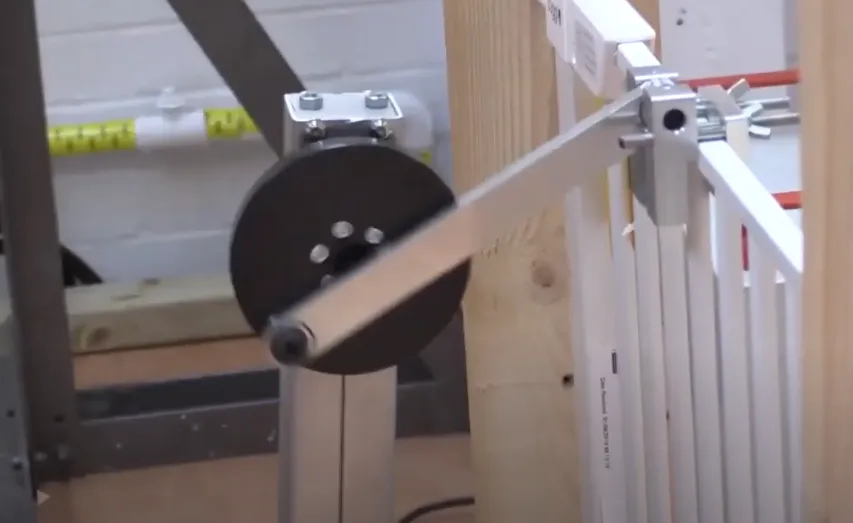ASTM F2194 Infant Bassinets and Cradles Safety Testing
The ASTM F2194 standard specifies requirements for infant bassinets and cradles, which are designed to ensure the safety of infants while they are in a supine sleeping position. This standard is particularly important as it addresses potential hazards that could harm an infant's health or well-being.
The testing procedures outlined in ASTM F2194 cover various aspects including structural integrity, stability, durability, and compatibility with other nursery products such as crib mattresses and bedding materials. Compliance with these standards can help manufacturers ensure their products meet the highest safety benchmarks before they reach consumers.
Testing laboratories specializing in this area typically perform a range of physical tests to evaluate key performance indicators outlined by ASTM F2194. These include, but are not limited to:
- Stability and durability under static load
- Edge strength testing for the sides and top
- Mechanical stress tests on hardware components like screws and bolts
- Elastic deformation assessment of materials used in construction
- Impact resistance evaluation against realistic environmental conditions
The laboratory utilizes advanced equipment such as load frames, universal testing machines, and environmental chambers to conduct these assessments accurately. Each test aims at identifying potential weaknesses or defects that could pose risks during use.
In addition to structural evaluations, ASTM F2194 also emphasizes the importance of ensuring proper compatibility between bassinets/cradles and other components like crib mattresses. This is crucial because improper fitment can lead to unsafe sleeping arrangements where infants might get entangled or suffocate. Compliance laboratories provide detailed reports highlighting any discrepancies found during these checks.
Compliance with ASTM F2194 not only enhances consumer confidence but also protects manufacturers from legal action due to product liability issues. By adhering strictly to all specified procedures, companies demonstrate their commitment to producing safe products that meet industry best practices.
| Test Parameter | Description |
|---|---|
| Stability under Load | Evaluates how well the bassinet/cradle resists tipping when subjected to specified weights. |
| Mechanical Stress on Hardware | Assesses the resistance of fasteners against pulling forces that could occur during typical use. |
| Elastic Deformation Measurement | Determines whether materials used in construction undergo unacceptable deformation under normal loads. |
| Impact Resistance Testing | Simulates real-world scenarios where the bassinet might experience impacts, ensuring it remains stable and secure. |
These tests are critical steps towards achieving compliance with ASTM F2194. They ensure that every aspect of an infant’s sleeping environment adheres to rigorous safety standards set forth by this internationally recognized standard.
Benefits
- Enhanced Consumer Confidence: Ensures that products are safe and reliable for use by infants.
- Legal Protection: Reduces the risk of product liability lawsuits.
- Market Differentiation: Demonstrates a commitment to quality, potentially increasing market share.
- Regulatory Compliance: Meets international standards recognized globally.
Industry Applications
| Application Area | Description |
|---|---|
| Nursery Product Manufacturers | Manufacturers of infant bassinets and cradles need to comply with ASTM F2194 to ensure their products are safe for use. |
| Safety Inspection Agencies | These agencies rely on ASTM F2194 as a benchmark when inspecting nursery products for safety compliance. |
| Purchasing Departments in Retail Stores | Retailers use ASTM F2194 to verify the safety of bassinets and cradles before placing them on their shelves. |
Quality and Reliability Assurance
Ensuring quality and reliability in infant bassinets and cradles is paramount, especially given the sensitive nature of these products. The testing process outlined by ASTM F2194 plays a crucial role in maintaining consistent product performance across all batches produced.
By employing stringent quality control measures throughout manufacturing processes, companies can minimize variability in product characteristics. This consistency ensures that each bassinet or cradle meets the exacting standards set forth by ASTM F2194 consistently.
The use of sophisticated testing equipment further reinforces this commitment to excellence. Regular calibration and maintenance of these instruments guarantee accurate results every time, thereby enhancing overall reliability.
Furthermore, continuous monitoring of production lines allows for immediate identification and correction of any deviations from standard procedures. Such proactive measures contribute significantly towards maintaining high levels of quality control throughout the lifecycle of a product.
In summary, adherence to ASTM F2194 fosters an environment where both manufacturers and consumers can trust that every bassinet or cradle meets stringent safety requirements. This trust translates into increased sales and loyalty among customers who feel assured about purchasing safe products for their babies.





